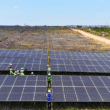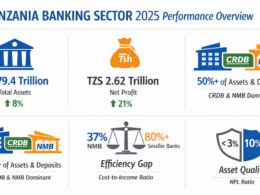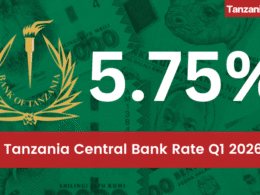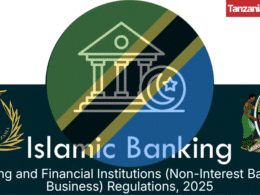TanzaniaInvest conducted an exclusive interview with Muhsin Salim Masoud, Managing Director of People’s Bank of Zanzibar (PBZ), one of the oldest and most respected banks in Tanzania, until May 2024.
PBZ has played a pioneering role in providing financial services across Zanzibar and, mainland Tanzania, and in introducing Islamic banking services in the country.
Dr. Masoud comments on PBZ’s strong financial performance in 2022 and shares the bank’s future growth plans and outlook for target sectors.
He also provides his insights on Tanzania’s current economic opportunities and developments and discusses the country’s promising economic trajectory amidst reforms and infrastructure development.
TanzaniaInvest: Can you tell us about the origins and ownership structure of PBZ and its evolution into a bank active throughout Tanzania?
Muhsin Salim Masoud: PBZ is a fully-fledged commercial bank that is 100% owned by the Revolutionary Government of Zanzibar. It was established in June 1966 by the first president of Zanzibar, Mr. Abeid Amani Karume, shortly after the Zanzibar Revolution in 1964.
For many years, PBZ’s operations were confined only to Zanzibar, reflecting its origins and public ownership by the Zanzibar government. It was the leading bank on the islands. Then around 2010, PBZ started expanding to open branches across mainland Tanzania as part of a strategic push to become a nationally operating commercial bank.
Today, PBZ maintains a strong presence and brand identity in Zanzibar given its history, while expanding its customer base across the mainland. It continues to be 100% owned by the Revolutionary Government of Zanzibar. The people of Zanzibar have a strong affinity and loyalty towards PBZ arising from its government ownership and pioneering role in the islands’ banking history and economic development.
” PBZ maintains a strong presence and brand identity in Zanzibar given its history, while expanding its customer base across the mainland.”
TanzaniaInvest: What is the impact of being fully government-owned on PBZ’s operations and governance compared to private commercial banks?
Dr. Muhsin Salim Masoud: In terms of PBZ’s core banking operations – taking deposits, providing loans, transaction banking, forex services etc. – we function much like any other commercial bank. We adhere to all the same banking regulations and standards set by BOT for areas like capital adequacy, liquidity management, financial reporting, audits, inspections, etc.
However, there are some notable differences arising from PBZ’s full ownership by the Revolutionary Government of Zanzibar:
– Oversight and governance – There is extensive oversight from government bodies, more stringent than for private banks. Our annual budgets, financial statements, procurement contracts, the appointment of auditors etc. require approval from relevant authorities like the Ministry of Finance.
“We are 100% owned by the Revolutionary Government of Zanzibar. Our annual budgets, financial statements, procurement contracts, the appointment of auditors etc. require approval from relevant authorities like the Ministry of Finance.”
– Employment policies and salaries – As a public entity, PBZ follows government regulations around hiring procedures, payroll structures and salary scales rather than fully flexible HR policies.
– Decision making – Some business decisions require government approval through sometimes lengthy procedures which can impact agility and responsiveness as a commercial bank. We are engaging the government on reforms to allow appropriate autonomy for management while retaining oversight.
So, in summary, the operations are comparable but governance mechanisms have additional complexities due to the full public ownership. However, we aim to function as commercially and efficiently as private sector competitors.
TanzaniaInvest: PBZ is one of the very few banks in Tanzania to offer Islamic banking products. What drove this strategic move?
Dr. Muhsin Salim Masoud: For over 40 years since its founding in 1966, PBZ functioned as a conventional commercial bank with no Islamic banking offerings. Then in 2011, we established a dedicated Islamic Banking division and launched Sharia-compliant products to cater to growing market demand.
“In 2011, we established a dedicated Islamic Banking division and launched Sharia-compliant products to cater to growing market demand.”
The origins can be traced back to 2004 when we first seriously considered Islamic banking at PBZ. Extensive research studies were commissioned, both internally and by consulting firms, to assess the market potential. The global Islamic finance industry was also starting to grow rapidly.
In 2009, KCB became the first bank in Tanzania to launch an Islamic banking window. Then in 2011, both PBZ and Amana Bank opened dedicated Islamic banking divisions and launched full-fledged Islamic banks. We had identified an underserved segment among Muslim communities who sought banking services compliant with religious beliefs.
Since the launch, we have seen a very positive uptake as customers welcomed the availability of Sharia-compliant financial services. The successful adoption validated our initial studies pointing to strong demand. We have continued enhancing the products, services and branch network for our Islamic banking division over the years.
TanzaniaInvest: In your assessment, how big is the potential market and growth for Islamic finance in Tanzania?
Dr. Muhsin Salim Masoud: I see huge potential for growth in Islamic finance here, reinforced by the trends since PBZ launched Sharia-compliant banking. Initially, we were only the second Islamic bank, after Amana Bank in 2011. But over the last decade, many other major banks like NBC and CRDB have also established Islamic banking units, pointing to sizable market demand.
“I see huge potential for growth in Islamic finance here, reinforced by the trends since PBZ launched Sharia-compliant banking.”
Islamic banking principles require avoiding interest and sharing risks – these appeal to both Muslim communities desiring banking services compliant with religious beliefs, as well as other customers attracted by the ethical foundations.
The growth of Islamic finance has also gained strong regulatory support, as BOT and other agencies have been enhancing the enabling environment through reforms. As the ecosystem expands with the availability of products like Islamic bonds (sukuk), Islamic insurance (takaful) etc., this will enable faster growth.
Although still a young industry here, I foresee Islamic finance significantly increasing its market share over the next decade to become a mainstream segment. PBZ aims to remain at the forefront given our early entrant advantage.
TanzaniaInvest: Turning to PBZ’s financial performance – profits doubled in 2022 on the back of 50% growth. What were the key drivers behind these standout results?
Dr. Muhsin Salim Masoud: There were a few major factors that fueled the strong performance:
– Improved operational efficiency – we made changes to service delivery, branch operations, product distribution and marketing compared to previous years. Tighter cost control also helped.
– Supportive government policies – the banking sector and broader economy have been stimulated by accommodative fiscal and monetary initiatives.
– Public salary increases – our strategic focus on the government employees’ segment as core retail lending customers provided a boost as their salaries rose 10% last year after almost a decade. Higher incomes spur appetite for our products.
– Economic activity – government investments in infrastructure development and construction projects have accelerated broad economic growth. This translates to higher lending demand.
The combination of these factors created a very conducive environment for PBZ to achieve record performance. Our net profit after tax grew 50% year-on-year, allowing an unprecedented dividend of TZS 10 billion paid to our shareholder.
“Our net profit after tax grew 50% year-on-year, allowing an unprecedented dividend of TZS 10 billion paid to our shareholder.”
TanzaniaInvest: What approach does PBZ take to mitigate risks for its major lending segments-retail customers-and for SMEs who often lack collateral or long credit histories?
Dr. Muhsin Salim Masoud: For retail lending, our primary focus is salaried employees, particularly in the public sector. We have pioneered lending against salaries, where instalments are directly deducted from payroll. This provides a secure, low-risk asset class for PBZ.
“For retail lending, our primary focus is salaried employees, particularly in the public sector. “
Stringent underwriting standards are applied, leveraging extensive databases of public servant salaries and employment records built over decades. We also invest heavily in credit skills and collection capabilities. Our non-performing loan ratio is just 2.97% – one of the lowest in the industry.
For SME lending, risks are higher due to new ventures with more variable cash flows. We have taken a cautious approach, only piloting SME lending since 2022. With greater understanding, we hope to expand SME loans using techniques like cash flow-based analysis for established businesses, rather than reliance on collateral.
“We hope to expand SME loans using techniques like cash flow-based analysis for established businesses, rather than reliance on collateral.”
But retail lending will continue accounting for the major share of our portfolio. The government employees segment offers scale while minimizing risk.
TanzaniaInvest: Where does PBZ currently stand in Tanzania’s competitive banking industry, and what are your future strategies and growth targets?
Dr. Muhsin Salim Masoud: At present, PBZ is the 9th largest bank in Tanzania out of over 40 banks currently operating, with a market share of around 5% of total assets. The top 3 banks control over 40% market share.
Our ambition however is to join the top 3 rankings in the next 5 years. To achieve this, our strategies include:
– Aggressive branch network expansion – we aim to open 30 new branches and service centers across Tanzania in five years. Quick geographic coverage is essential.
– Developing digital capabilities – we are modernizing channels and rolling out mobile/internet banking to expand customer reach.
– Maintaining low-cost structure – our interest rates and fees are among the most competitive, appealing to mass market segments.
– Leveraging brand reputation – our legacy in Zanzibar provides an advantage in customer trust.
– Considering strategic acquisitions/mergers – to accelerate growth and geographic presence if viable targets emerge.
“We aim to open 30 new branches and service centers across Tanzania in five years. Our ambition however is to join the top 3 rankings in the next 5 years.”
However, competition is intense with many banks pursuing similar strategies. Long-term success will require scale, so consolidation of smaller banks through M&A transactions may be necessary and sensible. PBZ will be proactive in considering good opportunities if they arise.
TanzaniaInvest: Which sectors of Tanzania’s economy are most promising from PBZ’s perspective?
Dr. Muhsin Salim Masoud: The construction sector stands out as a great opportunity now given the heavy investments into infrastructure projects for highways, housing, commercial buildings and more. We aim to be a major financier of construction loans.
“The construction sector stands out as a great opportunity now given the heavy investments into infrastructure projects. The “blue economy” sectors like fishing, but also tourism, transportation and seabed mining hold enormous potential.”
In future, the “blue economy” sectors like fishing, but also tourism, transportation and seabed mining hold enormous potential as Tanzania leverages its strategic location and resources. We are watching developments closely though many companies are still early-stage and lack collateral.
Manufacturing is also a priority sector for Tanzania, as growing it will help achieve national development goals. As the sector expands, we hope to support industrial entrepreneurs through lending for plant and equipment, working capital, and other needs.
TanzaniaInvest: To conclude, how would you describe the current economic framework and outlook for Tanzania as it aims for next-level development?
Dr. Muhsin Salim Masoud: There are many promising signs and positive trajectories for Tanzania currently. The government is actively courting foreign investment, emphasizing economic diplomacy and promoting flagship development projects. Extensive infrastructure development is underway in roads, ports, housing etc. to catalyze growth.
Recent reforms also aim to engage the diaspora community more in investment and contribution of expertise. Additional changes like allowing non-citizens to own certain property could also attract foreign capital.
Financial services have seen considerable reforms and technological modernization over the past decade, creating a robust banking sector ready to facilitate economic growth through intermediation.
“Financial services have seen considerable reforms and technological modernization over the past decade, creating a robust banking sector ready to facilitate economic growth through intermediation.”
Overall, I am very optimistic about Tanzania’s future. The government’s development vision, policy direction and selective reforms have primed the economy for the next stage.
At PBZ, we are well-positioned to support the nation’s growth by providing essential banking services and credit for key sectors. With the current momentum and positive conditions, I am confident PBZ can achieve our ambitious growth plans to be a top-tier bank in Tanzania.











